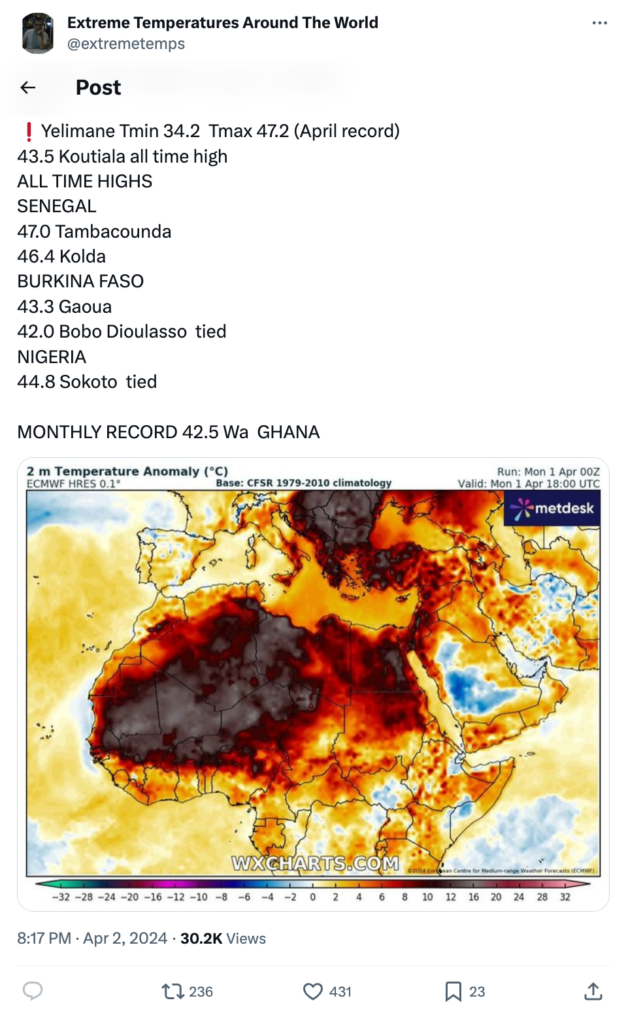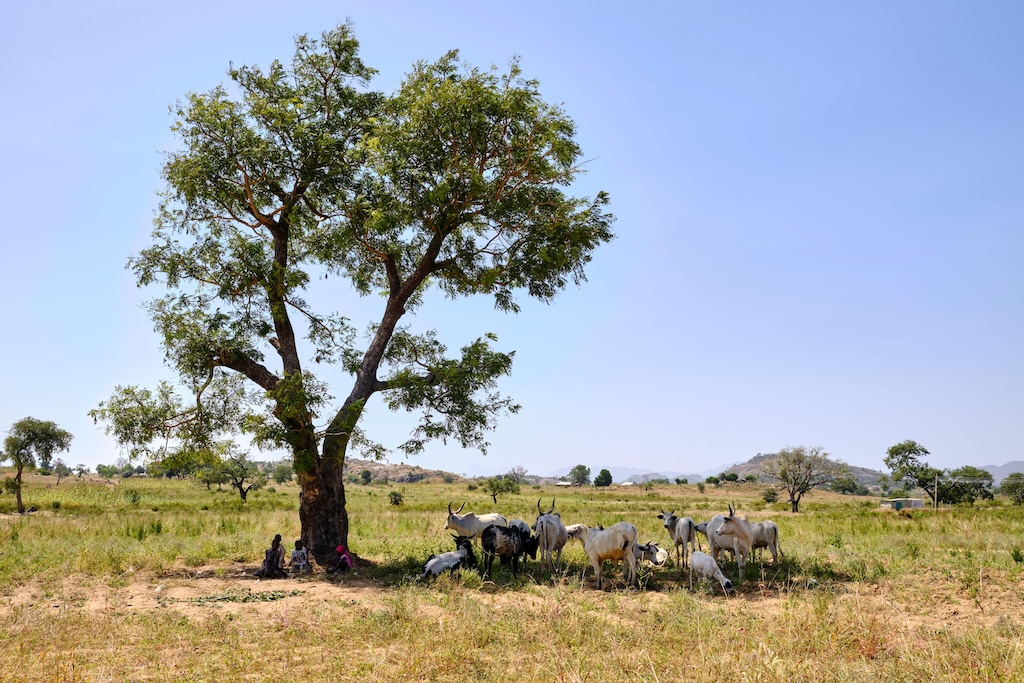[ad_1]
For the reason that begin of this 12 months, Africa’s most populous nation Nigeria has confronted extended stretches of extreme warmth.
A latest quick-fire evaluation discovered that the circumstances in February, when temperatures exceeded 40C, had been made 10 occasions extra possible by human-caused local weather change.
However the warmth continues to be ongoing, with temperatures reaching a file 44.8C in Sokoto, a metropolis in north-western Nigeria, on 1 April.
With information of warmth and its impacts missing in Nigeria, Carbon Temporary speaks to docs, farmers and meteorologists about how this episode of maximum climate is affecting the nation.
Well being impacts
The continuing excessive warmth in Nigeria is having a variety of well being impacts – and most of those are usually not being routinely recorded, consultants inform Carbon Temporary.

On 28 March, Nigeria’s nationwide electrical energy grid collapsed, plunging the nation right into a common blackout for the second time throughout the heatwave.
Regardless of its wealth of oil and gasoline, blackouts are frequent in Nigeria and many individuals depend on petrol and diesel mills to chill their properties. Nonetheless, gasoline costs have skyrocketed prior to now 12 months, placing such options out of the attain for a lot of Nigerians.
The impression of the warmth is “catastrophic”, Dr Ugo Uguwanyi, a physician in Abuja, Nigeria’s capital metropolis, tells Carbon Temporary:
“Don’t even hassle to step out from 10am to 6pm. And be sure to burn the diesel to energy the air con to have the ability to sleep at night time.”
Details about the heatwave’s impression is proscribed, however this doesn’t imply the climate circumstances are usually not harmful, based on the authors of the latest evaluation into the function of local weather change in Nigeria’s excessive warmth. Slightly, a scarcity of systematic reporting might obscure what they described as a “silent killer”.
The examine’s authors known as for “improved monitoring and analysis on the impacts and dangers related to heatwaves”.
Nigeria’s dry season runs roughly from December by means of to March – though it’s longer within the north of the nation and shorter within the south. Temperatures construct throughout this season, usually bringing extra reported circumstances of “meningitis, stress, stroke, blood strain and stroke”, Dr Uguwanyi says.
Such circumstances are prone to improve throughout intense heatwaves, that are projected to develop into extra frequent if international warming continues to speed up, he provides.
Dr Ebbi Robinson, chairman of the Nigeria Medical Affiliation within the oil-rich, southern state of Rivers, provides that whereas “there isn’t a particular documentation”, excessive warmth usually brings a rise in hospital visits to dermatologists, with signs reminiscent of rashes and itching.
He says that his affiliation is rolling out new strategies to warn folks of the well being impacts from excessive warmth:
“We’re making radio jingles and banners to let folks know these heatwaves are actual and sensitise them on how one can mitigate towards the direct and oblique penalties.”
In mid-February, the Nigerian Meteorological Company (NiMet) issued a public forecast warning on the extended heatwave.
The company suggested residents to remain hydrated, put on mild clothes and keep away from direct publicity to excessive temperatures throughout peak intervals. A gaggle of Nigerian docs additionally issued security suggestions.
Wasiu Adeniyi Ibrahim, a meteorologist at NiMet, tells Carbon Temporary:
“Heatwaves, characterised by extended intervals of excessively sizzling temperatures and humidity, have gotten extra frequent and intense.
“We now have noticed a departure of 2-4C from regular (long-time common temperature, 1991-2020) within the month of February. It’s clear that local weather change is bringing increasingly more dangerously sizzling days to Africa.”
Workforce impacts
In February, NiMet’s director of climate forecast providers, Vincent Weli, suggested {that a} state of emergency be declared in states most affected by the heatwave and employees be allowed to take breaks between midday and 3pm. Chatting with Nigeria’s Channels Tv, Weli mentioned:
“After all, you realize, with excessive temperature, cognitive growth might be affected and productiveness might be affected. There might be a lack of focus.”
The decision was mandatory as “the situation was beneficial for an outbreak of meningitis”, Ibrahim explains to Carbon Temporary:
“We noticed excessive mud focus mixed with this extreme warmth which may set off a meningitis outbreak. Epileptic energy provide, low ventilations and different components may make the scenario worse, if not correctly managed.”
Meningitis, an irritation of the membranes masking the mind and the spinal wire, is extra simply unfold in excessive warmth and dusty circumstances.
Nonetheless, no such directive has been issued by state governments.
“Many state governments in Nigeria are usually not taking climate and local weather data very significantly,” Ibrahim says.
In the meantime, in Lagos, Nigeria’s most populated metropolis, ride-hailing drivers are working below “melting” circumstances, caught between preserving their well being or livelihood, based on a Remainder of World report.
Agricultural impacts
The heatwave can also be anticipated to cut back agricultural productiveness, a sector that contributes about 22% to Nigeria’s gross home product (GDP) and accounts for greater than a 3rd of whole employment. Ibrahim tells Carbon Temporary:
“Heatwaves can scale back agricultural productiveness by inflicting warmth stress to crops and livestock.
“It may negatively have an effect on crop progress and growth by disrupting physiological processes, reminiscent of photosynthesis, respiration and water uptake. Excessive temperatures can result in wilting, leaf scorching and decreased nutrient uptake, impairing plant progress, fewer fruits and lowering yields.
“In animals, heatwaves might scale back feed consumption, decrease weight acquire, lower milk manufacturing, scale back reproductive efficiency and [cause] animal mortality, if correct mitigation measures are usually not in place.”

Once more, there’s not a number of information on how the present warmth is affecting agriculture in Nigeria.
Nonetheless, the nationwide secretary of the All Farmers Affiliation of Nigeria, Yunusa Halidu, tells Carbon Temporary its members anticipate the heatwave to have an effect on productiveness yield this 12 months. He says:
“The warmth is excessive this 12 months,though we’ve got been anticipating it, as we work with the Nigerian Meteorological Company. We all know it’s international warming and we’re working to see how we will mitigate the results.”
A shorter model of this text was first printed in DeBriefed, Carbon Temporary’s weekly local weather e-newsletter, on 5 April. Subscribe without cost.
Sharelines from this story
[ad_2]
Source link



